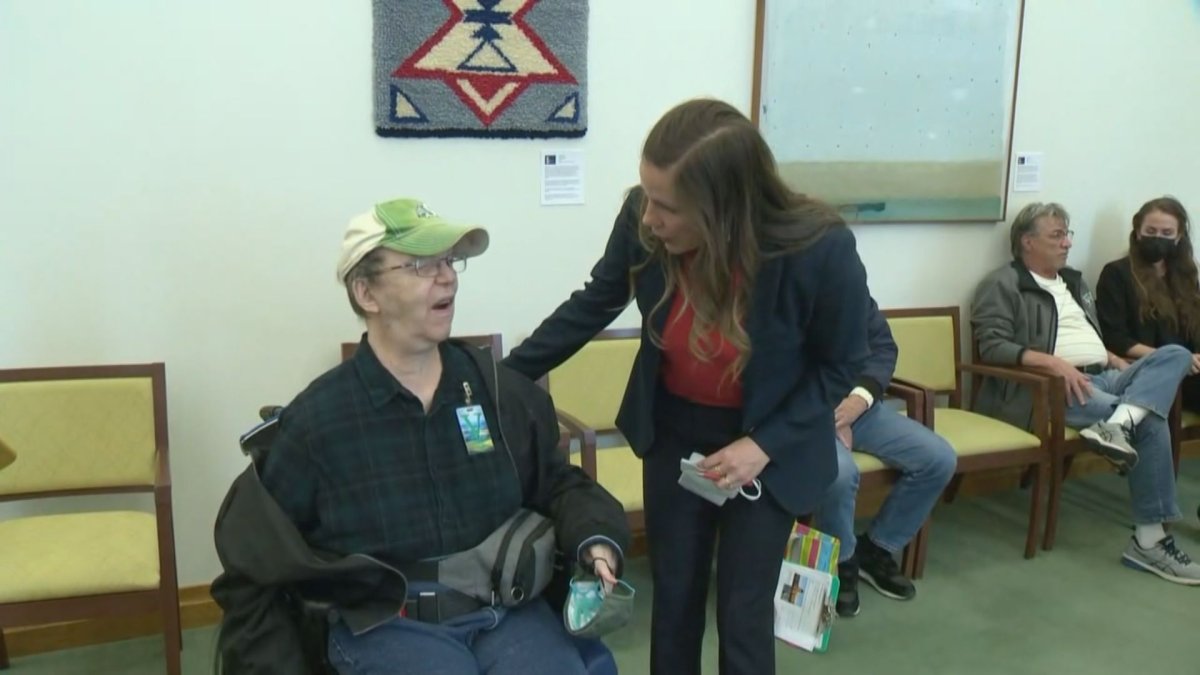On Monday, MLA Meara Conway and the NDP hosted a press conference calling on the provincial government to stop cuts and increase rates for the Saskatchewan Assured Income for Disability Program (SAID).

“The program has not seen an increase to its basic amounts in over seven years,” said Conway. “That represents a 20-per cent reduction in benefits for people living with disabilities in Saskatchewan.”
SAID is an income support program for people with significant and enduring disabilities. To be eligible for the program, you must be a Saskatchewan resident over 18 years of age, lack the financial resources for basic living expenses and have a significant or enduring permanent disability that requires assistance.
Barb Sambasivam, whose brother James is living with myotonic dystrophy, spoke about the lack of support the SAID program has provided to him.
“They have awarded him $83 a month in benefits from the SAID program,” said Sambasivam. “Jim’s care is $1850 a month. It is totally out of reach with these benefits.”
Conway said that in many situations for people living with disabilities applying for the SAID program, they are forced to withdraw early Canadian Pension Plans.
“(People) are required to apply for early CPP, and then they are eligible for less later in life, and that amount they get for CPP before they turn 65 is clawed back from their SAID rates anyways, so they are no further ahead. Indeed, they are further behind,” said Conway.
Saskatchewan Party MLA Lori Carr spoke on the issue, stating that all income is considered when individuals apply for the assistance program.

Get daily National news
“All income that individuals receive, whether it’s earned income or pension benefits, are treated as income,” said Carr. “So under our assistance programs, those are taken off before benefits are paid out.
“Our income assistance programs truly are a program of last resort. If you have an opportunity to earn income, one of those being your Canadian Pension benefits, then it’s something you need to apply for before you apply for income assistance benefits because you do have that opportunity to get that money.”
The amount of other income individuals receive separate from the SAID program affects how much money they are eligible for from SAID. For example, if someone’s Canadian Pension benefits are high, they would receive less income assistance.
“It all equals out in the end,” said Carr. “Within the province of Saskatchewan, our SAID benefits are actually amongst the highest across Canada.”
The program has not seen any increase in funding for seven years, something Dave Nelson, a senior consultant at the Canadian Mental Health Association and an original task team members that put together the SAID program, hopes changes soon.
“Nobody expects this to jump up gigantic amounts in one year,” said Nelson. “But if you start planning and saying, ‘Okay, in five years, we are going to be up to this (amount)’ then it’s doable and it should be done.”
Nelson argues the program should be more than just an assistance program.
“The SAID program was and is meant to be an income replacement program, not just an income support program,” said Nelson.
For Carr, however, she classifies it as an income assistance program, rather than a replacement.
“I would consider it an income assistance program,” said Carr. “Some people on this program do have enduring disabilities, but some of them do have the capability of working depending on that disability. Just because they have a disability, doesn’t make them unable to better themselves.”
Peter Gilmer of the Regina Anti-Poverty Ministry was also in attendance at Monday’s press conference, and said the program is meant to provide a safety net for people like James who are struggling to afford many basic living expenses.
“We need to make sure people are allowed to live in dignity and the first building block of that is ensuring there is a social safety net that provides a floor of income that allows you to meet your most basic needs,” said Gilmer.
“I would suggest SAID today does not do that.”








Comments